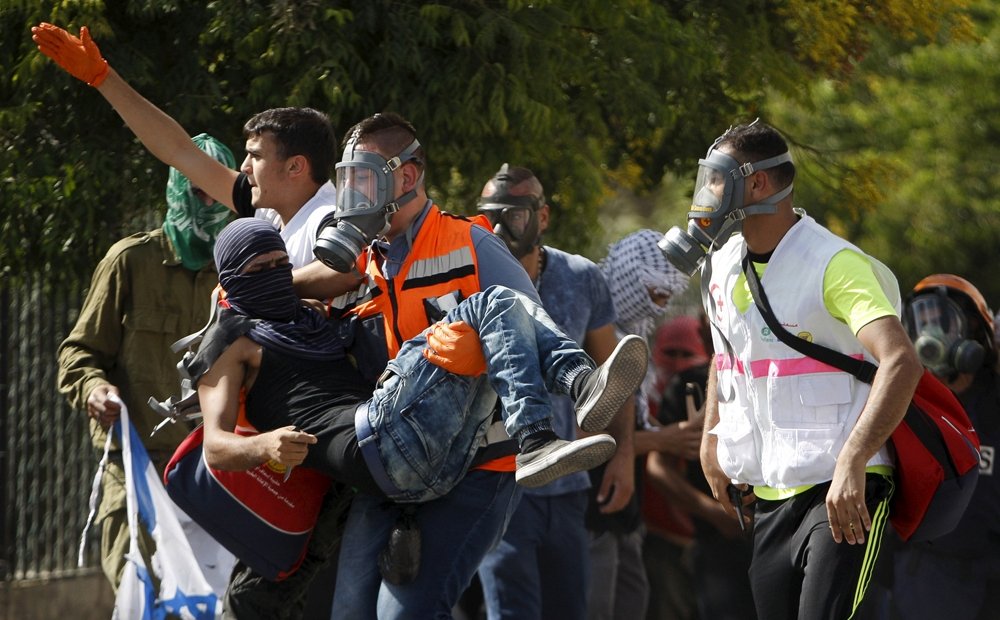Israeli-Palestinian Confrontation: Just Another Round or Tipping Point?

The Takeaways:
1. This is a “new era” in the Israeli-Palestinian conflict, according to Mr. Shikaki. Palestinian youth have largely lost faith in the Two-State Solution, the Palestinian Authority and the Arab world at large. They’re now attempting to shape their own destiny.
2. Beyond the physical violence, this conflict is fueled by competing narratives. As Israel claims it is acting in self-defense, Palestine claims it is fighting against occupation. The result is a lack of empathy for the other.
3. As the violence and crackdowns intensify, some think that we are moving towards an ugly and violent one-state reality, rather than a peaceful, mutually agreed two state solution.
The hope for a peaceful, mutually agreed upon, two-state solution between Israel and Palestine has largely dictated U.S. and international policies for the past several decades. While this hope and vision for a peaceful settlement between the Israeli Government and the Palestinian Authority has survived through several full-blown wars and political conflicts, the most recent waves of attacks – and subsequent clampdowns – in East Jerusalem may kill the chance of a peaceful settlement once and for all.
Unlike past resistance movements and intifada’s, the current Palestinian movement is not organized from the top-down; it’s driven by decentralized youth who, according to Dr. Shikaki in Ramallah, have lost faith in the “Palestinian authority…the Arab world…and diplomacy all together.” As these youths watch Israeli settlements go up unopposed, Dr. Shikaki speculates that the feelings of national and international abandonment are being further compounded by Palestinian perceptions that Israel is subverting the status-quo in and around Jerusalem’s holy sites, namely the Temple Mount and the Al Aqsa Mosque. In addition, Israel’s inability to produce a culprit for July’s arson attack in Duma have further solidified Palestinian views that “there is no difference between the Israel Defense Force and the settlers.” With no one turn to, Palestinian youths are taking matters into their own hand.
Dr. Ashrawi – also calling from Ramallah – agreed with Dr. Shikaki on the underlining causes of the recent violence. However, in her opinion, the Israeli government has failed to understand the current unrest and is only making matters worse by advocating a return to the status-quo – the same reality she blames for bringing about the current situation. “This didn’t happen in a vacuum,” she says. The government’s crackdown in Arab-Israeli neighborhoods is, in her opinion, only re-enforcing the Palestinian perception that “East Jerusalem is occupied territory.” Dr. Ashrawi insists that order cannot be restored unless Israeli and Palestinian leaders understand and respond to the youths’ grievances. For that, “we need intervention,” from the U.S. and others; in her opinion, a solution cannot come from the inside.
Speaking to Dr. Ashrawi’s closing remarks, Mr. Alpher stated that the current unrest was “an internal Israeli affair,” noting that the Palestinians in East Jerusalem live under Israeli law. That said, he too criticized the Israel’s delayed response to the Jewish-Arab conflict pertaining to the Temple Mount, and its tepid response to the Duma arson attack. In his opinion, these Israeli responses, coupled with the wider, regional sectarian tensions in the Middle East, are leading to “street religious extremism…seeping in with the Palestinians and Israelis.” He also believes that Israel’s response to the recent violence – blockading Palestinian neighborhoods – will only inspire further violence, calling Israel’s current strategy a “mild form of apartheid.” As both Israel and Palestine continue to be guided by increasingly extreme rhetoric he cautioned that we are in danger of killing any hope of a brokered solution to the conflict and instead are ushering in an ugly “one state reality.”
Whatever the outcome may be, Ms. Rudoren believes that the current reality has shown that the former status-quo is not sustainable. While polling has long shown that majorities on both sides desire but don’t believe in the Two-State Solution, she believes that neither side can continue its long-held postures. “This conflict is about narratives,” she said. Both Israel’s longstanding claim that is acting in self-defense and Palestine’s claim that it is fighting against oppression, have resulted in very few people having connections with the other side. In her opinion, it is “the debasing, misunderstanding and lack of empathy” that allows the conflict to go on. Without serious communication, between both leaders and citizens, there can be no progress.
Speakers

Hosted By

Middle East Program
The Wilson Center’s Middle East Program serves as a crucial resource for the policymaking community and beyond, providing analyses and research that helps inform US foreign policymaking, stimulates public debate, and expands knowledge about issues in the wider Middle East and North Africa (MENA) region. Read more
